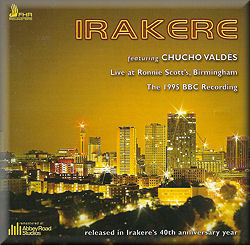1. Pare cochero
2. Mister Bruce
3. La Explosion
4. Yemayá
5. Tema del Gordo
6. Lo Que Va a Pasar
Chucho Valdés - Piano, director
Leo Vera, Carlos Manuel, Mayra Caridad Valdés - Vocals
José Miguel Meléndez - Vocals, percussion
Juan Munguía, Adalberto Lara ‘Trompetica’ - Trumpets
César López - Alto sax
Alfredo Thompson - Tenor sax
Carlos D’l Puerto - Bass
Enrique Plá - Drums
Andrés Miranda ‘El Negrón’ - Congas
The Cuban band Irakere was formed in the early 1970s and became a regular attraction at Ronnie Scott's club in London. This album was recorded by the BBC in 1995 at the Ronnie Scott club in Birmingham, where you can hear the audience reacting with enthusiasm for the band's performance.
The band no longer had such former star soloists as Arturo Sandoval and Paquito D'Rivera but it was still a powerful group, directed with avidity by its leader, pianist Chucho Valdes. Chucho's piano is excellent in the opening
Pare cochero (which means "Stop, coachman") and the percussion is exciting. Leo Vera sings with passion, although the lyrics here and elsewhere are in Spanish (I presume), so it is hard to make out what the song is about.
The second track,
Mister Bruce, is an instrumental, featuring glittering piano from Chucho Valdes and cogent ensemble work from the band. The album is almost worth buying for Valdes' solo alone. On some of the other tracks, the prominent vocals tend to get in the way of the instrumental brilliance of Chucho and the band, especially when the vocalists repeat the same passages over and over again.
La Explosion (a tune based on
Love for Sale) provides space for individual musicians to show their paces, with Chucho and tenorist Alfredo Thompson outstanding. Chucho's vocalist sister, Mayra Valdés, is a bit too melodramatic in
Yemayá but Alfredo Thompson plays a swirling tenor solo which, as the sleeve-note says, "is pure Sonny Rollins". The song only consists of two words - "Yemayá Olodum" - which Mayra repeats over and over before moving into scat.
In
Tema del Gordo (which the sleeve-note translates as "Theme of the fatty"), the vocalists repeat incomprehensible words as if they are rappers, while the band riffs endlessly.
Lo Que Va a Pasar starts with an instrumental ensemble but the vocalists soon take over. They may be good singers but they are painfully repetitive and they occupy space which would be better employed with more of the fine jazz which the band is quite capable of. On this final track, the repetition becomes tiresome when one over-excited singer gets the audience to join in community singing.
Tony Augarde
www.augardebooks.co.uk
